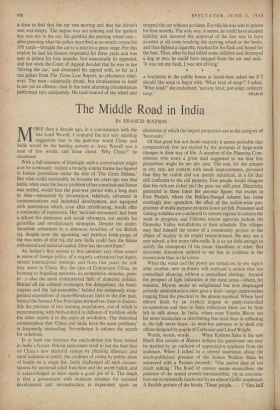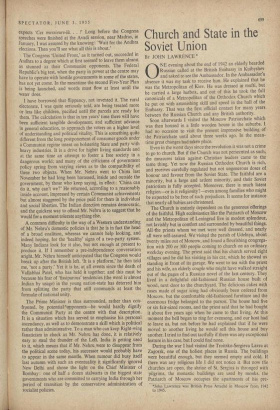The Middle Road in India BY FRANCIS WATSON M ORE than
a decade ago, in a conversation with the late Lord Wavell, I ventured the not very startling suggestion that in the post-war world China and India would be the leading powers in Asia. Wavell was a man of few words, and those direct. 'Wily China?' he countered.
With a full measure of hindsight such a conversation might now be continued : indeed a broadly similar theme has figured in Indian journalism under the title of 'The Great Debate.' But what could reasonably be foreseen ten years ago was that India', when once the heavy problem of her constitutional future was settled, would face the post-war period with a long start in Asia—unscarred by devastation, reltitively advanced in communications and industrial development, and equipped with institutions which, even after refashioning, would offer a continuity of experience. Her 'national movement' had been a school for statesmen and social reformers, not merely for guerrillas and revolutionary strategists. Despite the under- standable references to a damnosa hereditas. of the British raj, despite even the agonising and perilous birth-pangs of the two heirs of that raj, the new India could face the future with moral and material capital. How has she used them?
An Indian's first answer to this question very often comes in terms of foreign policy, of a vaguely understood but highly valued international prestige: and from that point the talk may move to China. But the idea of Communist China, its looming or beguiling nearness, its competitive stimulus, pene- tn ,,s also the more controversial field of domestic politics. Behind all the cultural exchanges, the delegafions, the band- wagons and the 'art-ensembles,' behind the commonly exag- gerated expositions of trans-Himalayan links in the dim past, behind the famous Five Principlesthemselves, there is discern- ible the pressure of two teeming populations, one of which is experimenting with birth-control in defiance of tradition while the other rejects it in the name of revolution. The rhetorical commonplace that 'China and India have the same problems' is frequently misleading. Nevertheless it colours the search for solutions.
' In at least one instance the catch-phrase has been turned in India's favour. Peking spokesmen tried to put the best face on China's new electoral system by pleading illiteracy and t rural isolation to justify the crudities of voting by public show of hands on a single list. India challenged all such circum- stances by universal adult franchise and the secret ballot, and is acknowledged to have made a good job of it. The result is that a government with immense schemes for national development and reconstruction is dependent upon an electorate of which the largest proportion are in the category of 'have-nots.'
Of that great but not dumb majority it seems probable that comparatively few are excited by the prospect of large-scale changes in their way of life. A member of the Planning Com- mission who tours a great deal suggested to me that this proportion might be ten per cent. The rest, for the present at any rate, are content with small improvements, provided that they be visible and not merely statistical, in a lot that still conforms to the old patterns. Few people would disagree that the rich are richer and the poor are still poor. Electricity generated is three times the pre-war figure; but except in East Punjab, where the Bakhra-Nangal scheme has come excitingly into operation, the effect of the nation-wide pro- gramme of multi-purpose projects is not yet felt. Pressmen and visiting notables are conducted to remote' emote regions to admire the work in progress, and Calcutta tourist agencies include the Damodar Valley installations in their schedule. The villager may find himself the centre of a community project or the object of inquiry to an expert research-team. He may see a new school, a few more tube-wells. It is as yet little enough to satisfy the champions of his cause, Gandhian or other. But economic discontent seemed to me less in evidence in the countryside than in,the towns.
When the water and the power are turned on, in one region after another, new problems will confront a nation that has centralised planning without a centralised ideology. Around the prospect of light industries in the rural areas—where, for instance, Mysore under an enlightened but now disparaged princely administration once gave a lead—surge controversies ranging from the practical to the almost mystical. Where land reform leads by an explicit dogma to party-controlled co-operatives and then to State collectives there can be little left to talk about. In India. where even Vinoba Bhave has far more headaches in distributing free land than in collecting it, the talk never stops—in mud-hut ashrams or in sleek city offices designed by pupils of Corbusier and Lloyd Wright.
Words, words, words. . . . When Kishore Sahu in the new Hindi film version of Hamlet deflates his questioner one may be startled by an outburst of appreciative applause from the audience. When I talked to a retired statesman about the much-publicised promise of the Indian Welfare State he answered with a Persian proverb : The parrot died of too much talking.' The flood of oratory seems staunchless, the patience of the seated crowds inexhaustible; yet in conversa- tion one is repeatedly fascinated by an almost Gallic scepticism. A flexible gesture of the hands. 'These people. . . !' One half expects 'Ces messieurs-la. . . P Long before the Congress speeches were finished at the Avadi session, near Madras, in January, I was assured by the knowing : `Wait for the Andhra elections. Then you'll see what all this is about.'
The Congress `United Front,' as it turned out, succeeded in Andhra to a degree which at first seemed to leave them almost as stunned as their Communist opponents. The Federal Republic's big test, when the party in power at the centre may have to operate with hostile governments in some of the states. has not yet come. In the meantime the second Five-Year Plan is being launched, and words must flow at least until the water does.
I have borrowed that flippancy, not invented it. The rural electorate, I was quite seriously told, are being treated more or less like children, pacified until the parcels are ready for them. The calculation is that in ten years' time there will have been sufficient tangible development, and sufficient advance in general education, to approach the voters on a higher level of understanding and political vitality. This is something quite different from the long postponement of consumer goods under a Communist regime intent on bolstering State and party with heavy industries. It is a drive for higher living standards and at the same time an attempt to foster a free society in a dangerous world; and many of the criticisms of government policy spring from varying views as to the compatibility of these two objects. When Mr. Nehru went to China last November he had long been harassed, inside and outside the government, by those who keep saying, in effect : 'China can do it, why can't we?' He returned, according to a reasonably inside account, impressed by certain Communist achievements but almost staggered by the price paid for them in individual and social liberties.. The Indian direction remains democratic, and the quickest way to offend Mr. Nehru is to suggest that he would for a moment tolerate anything else.
A common difficulty in the way of a Western understanding of Mr. Nehru's domestic policies is that he is in fact the head of a broad coalition, whereas we cannot help looking, and indeed hoping, for the 'healthy' signs of a two-party system. Many Indians look for it also, but not enough at present to produce it. If I remember a pre-independence conversation aright, Mr. Nehru himself anticipated that the Congress would break up after the British left. `It is a platform,' he then told me, 'not a party.' Yet it is he, at all events since the death of Vallabhai Patel, who has held it together: and this must be because his fear of 'fissiparous' tendencies (the word is almost Indian by usage) in the. young nation-state has deterred him from splitting the party that still commands at least the formula: of national unity.
The Prime Minister is thus surrounded, rather than con- fronted, by potential '"opponents—he would hardly dignify the Communist Party at the centre with that description. It is a situation which has served to emphasise his personal ascendancy, as well as to demonstrate a skill which is political rather than administrative. To a man who can keep Right-wing fanaticism in check as Mr. Nehru has done, it is relatively easy to steal the thunder of the Left. India is getting used to it. which means that if Mr. Nehru were to disappear from the political scene today, his successor would probably have to appear in the same mantle. When rumour did busy itself last autumn with such an eventuality it significantly ignored New Delhi and shone the light on the Chief Minister of Bombay : one of half a dozen stalwarts in the biggest state governments who are committed to carrying India through her period of transition by the conservative administration of socialist policies.



































 Previous page
Previous page